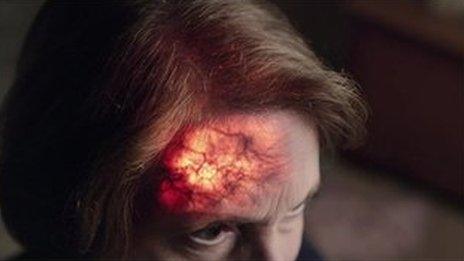Doctors call for wider use of new stroke treatment
- Published
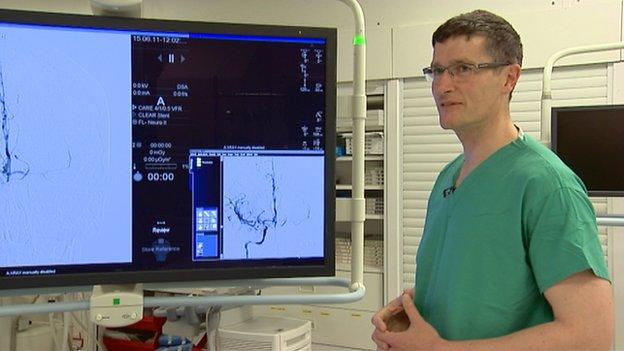
Neuroradiologist Dr Keston advocates wider use of the clot-catching treatment
Specialists are urging the Scottish government to make a new stroke treatment widely available.
Studies suggest the technique for removing blood clots in the brain doubles the chance of recovery for people who have suffered an ischaemic stroke.
The specially-designed "Solitaire" stent is highly effective at catching and removing blood clots.
However, it is currently only available at 28 specialist hospitals in the UK.
Stroke is one of the leading causes of disability in the UK, and the treatment could benefit a quarter of patients who have a particular type of blood clot in the brain.
One of the early beneficiaries of the procedure was Kerry Reid.
Just before Christmas in 2012, when she was 37, Mrs Reid woke up to find she was paralysed on one side and could not speak.
She was nine weeks pregnant at the time, but went on to make a full recovery and give birth to a healthy baby boy, called Sonny.
"I feel like I've won the lottery," said Mrs Reid, from Dundee.
"I feel so sorry for people who don't get the treatment I got. My life would have been so different if I hadn't had this.
"I was also very lucky that it didn't affect Sonny. It's like winning the lottery twice actually."
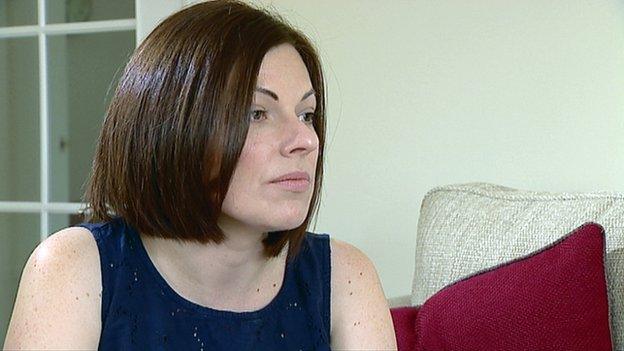
Kerry Reid from Dundee had a stroke while nine weeks pregnant, but made a full recovery
Mrs Reid was treated at the Western General in Edinburgh, where doctors are trialling the use of a Solitaire stent to treat ischeamic strokes.
Stents are normally used to hold open or strengthen damaged blood vessels, but experts realised this particular device was a very effective way to "catch" and remove blood clots.
"Kerry was having a very severe stroke," said neuroradiologist Dr Peter Keston.
"Without bringing normal blood flow back to the brain, her brain tissue would die and she would have been left with a permanent disability where she wouldn't have been able to move her left side.
"She would have been dependent on others for all her daily needs. However, we were able to extract that blood clot and give the brain oxygen, bringing it back to life."
"I've got it all back," said Mrs Reid.
"My eyesight, movement, speech, everything. It's almost as if it never happened."
Dr Keston demonstrated the stent using a piece of tomato in a tube of water
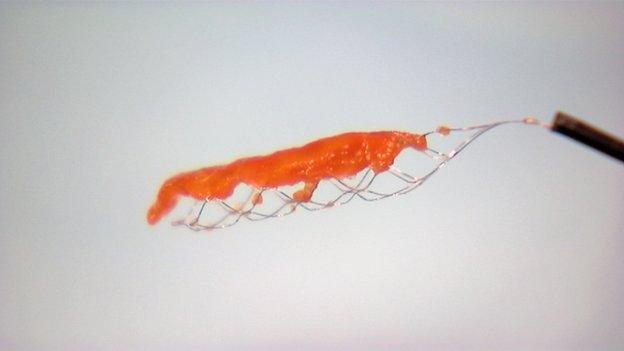
The Solitaire stent made short work of the tomato clot
The Solitaire stent is made of a nickel-titanium alloy and looks like a net.
By demonstrating on a piece of tomato in water, Dr Keston showed me how he uses it to "catch" a blood clot and pull it out of the brain, via a catheter inserted at the top of the leg. The stent traps the tomato very effectively and allows Dr Keston to drag it out through the twists and bends of a blood vessel.
Mrs Reid was lucky in that her stoke occurred on a day when the equipment, theatre and specialists were all available.
"It happened that our angiogram room was free, we had all the staff and we had nursing colleagues available," said Dr Keston.
"Unfortunately we can't give that service to everybody at any time of the day or night, we just don't have the staff or equipment available. We're working really hard with the hospital and the Scottish government to get those resources and persuade them this is the right thing to do."
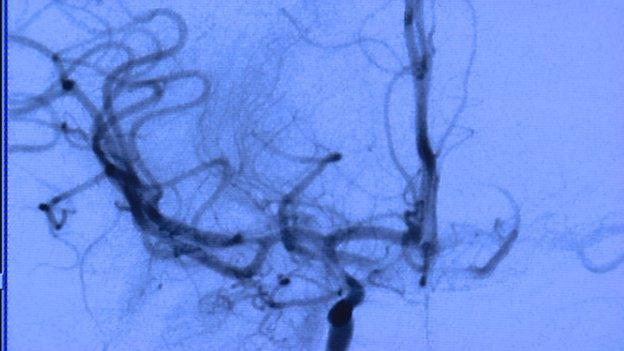
Ischaemic strokes make up one quarter of all strokes in the UK
The Solitaire stent is used more widely to treat strokes in nearly every other developed nation. In the UK, it is only being used in hospitals that specialise in interventional neuroradiology - and there are only 28 of those.
Anyone who has an ischaemic stroke needs to get to one of these centres within six hours to even have a chance of benefitting from it.
The health regulator for England and Wales, NICE, and Scotland's regulator, SIGN, have yet to issue guidance.
Dr Keston says it is understandable the government did not invest in the technique until its benefits were clinically proven, but in recent months five randomised control trials have demonstrated it dramatically reduces damage to the brain when performed within six hours.
Now Dr Keston believes there are huge savings to be made in reducing disability.
"Kerry wouldn't have been able to go back to work or look after her baby," he said. "Not everyone who has a stroke is as young as Kerry, but how much money does just one 'Kerry' save?"
Dr Keston and his colleagues are due to meet the Scottish health minister over the summer.
Scotland's Minister for Public Health, Maureen Watt, said: "We are aware of this particular trial and will be looking closely at the results over the summer. Stroke is a clinical priority for the Scottish government, and we have already provided some funding towards understanding the implications of this new treatment."
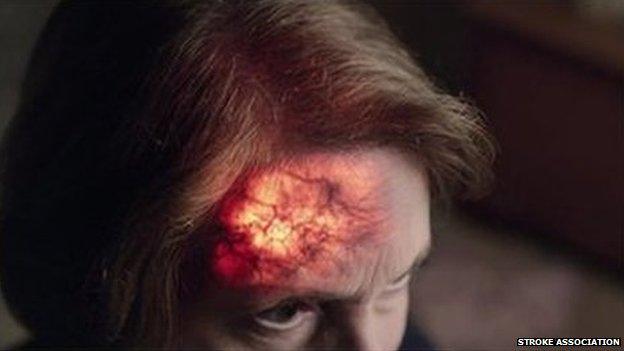
Stroke is one of the leading causes of disability in the UK
The treatment has also won the backing of Chest Heart and Stroke Scotland, external, a group offering free advice and support to stroke survivors and their families.
Chief executive Mark O'Donnell said the Solitaire stent method was "far more effective than any other treatment available".
He said: "This benefit is over and above that from clot busting alone and can sometimes be used even when patients cannot safely be given clot busting drugs.
"It is likely that 300 to 500 patients could potentially benefit from clot retrieval in Scotland each year.
"If this could be delivered, then over 100 people would avoid serious disability and many others would achieve improved outcomes from their stroke."
- Published16 June 2015

- Published22 August 2014
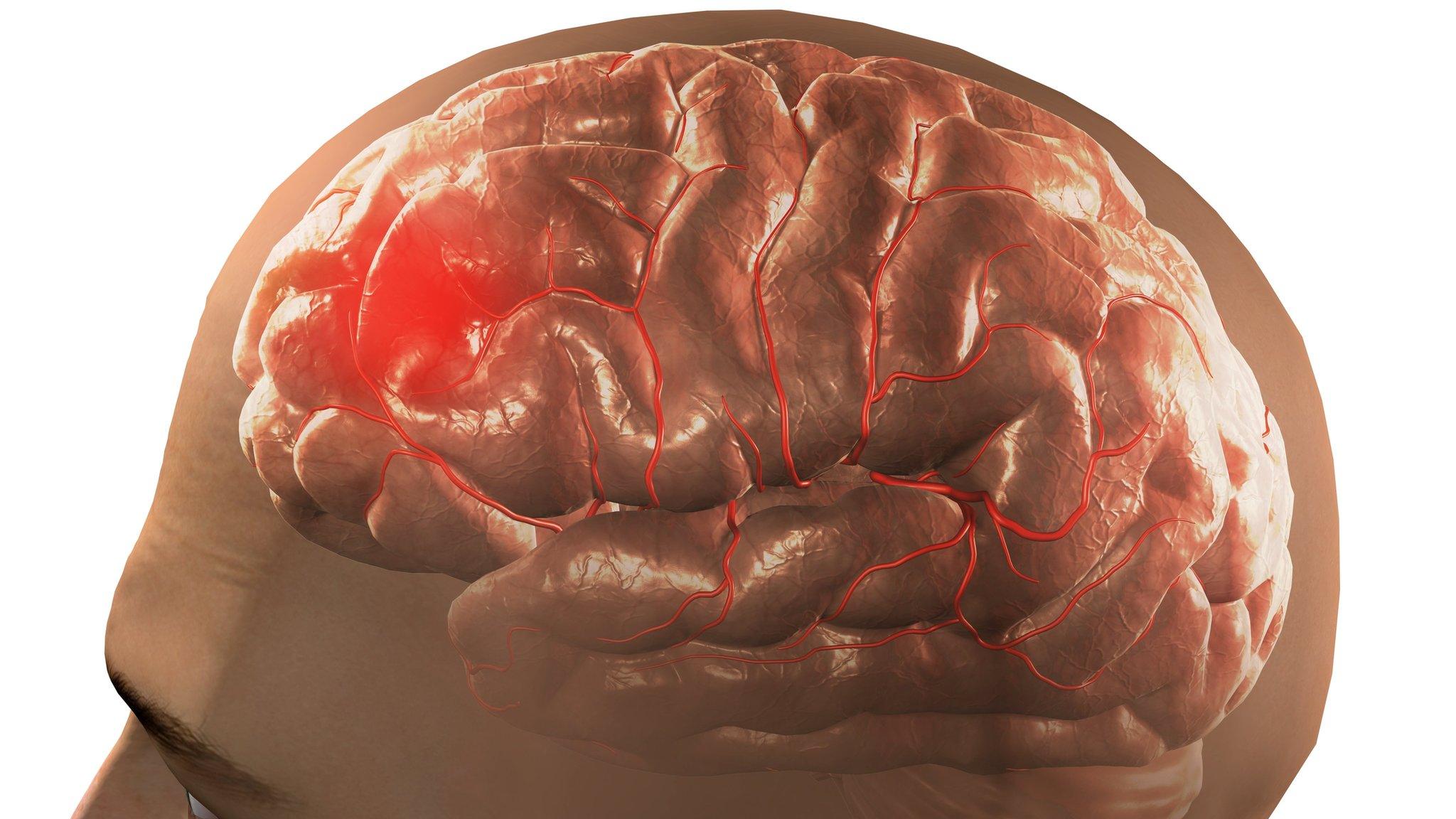
- Published1 May 2014
